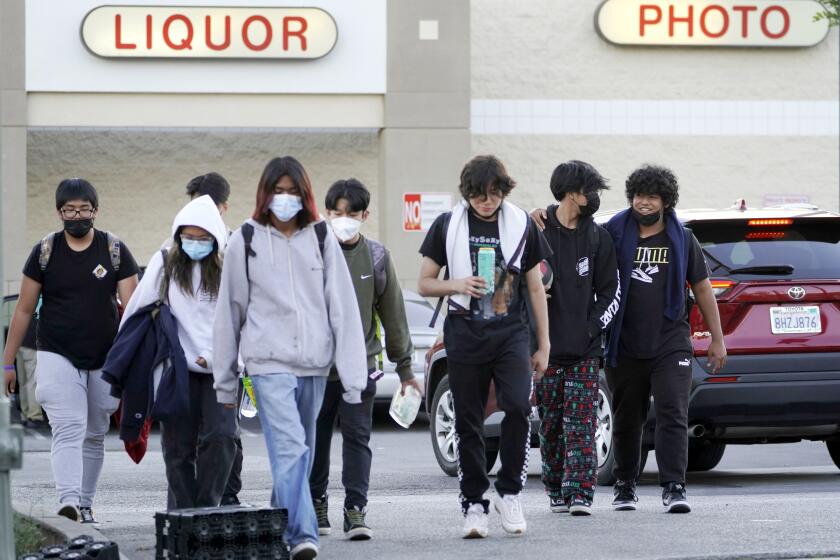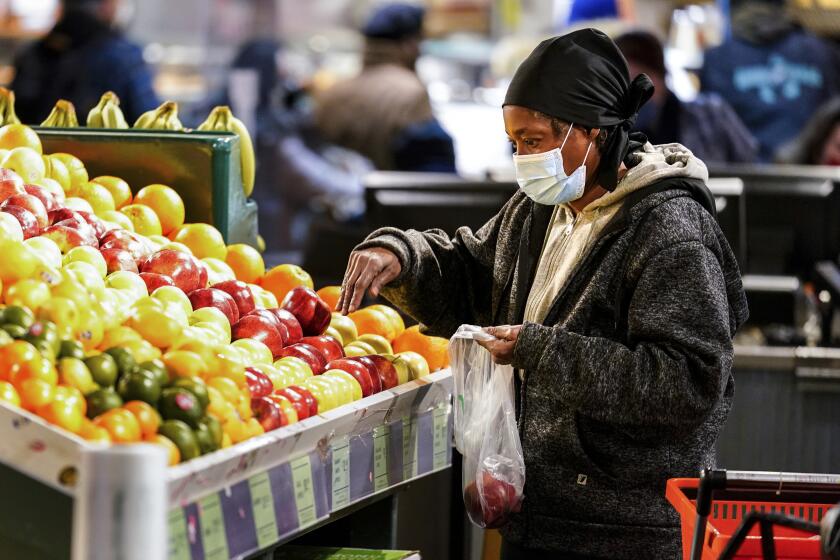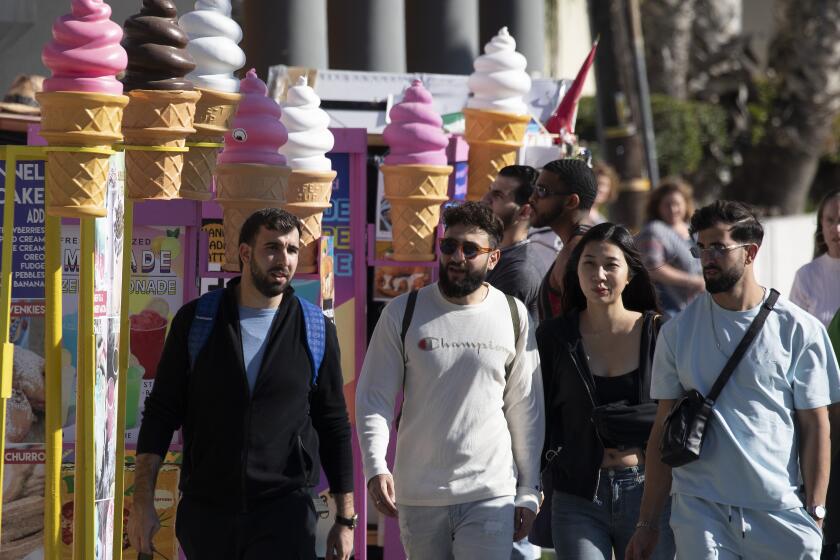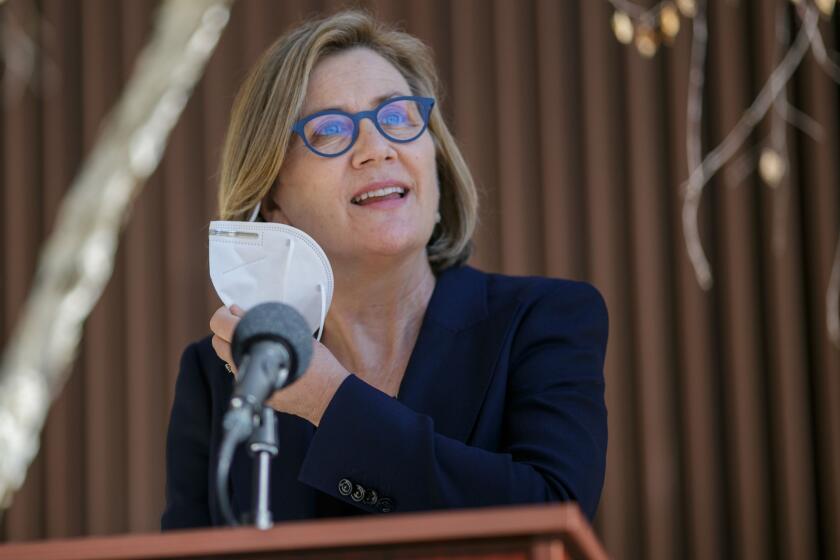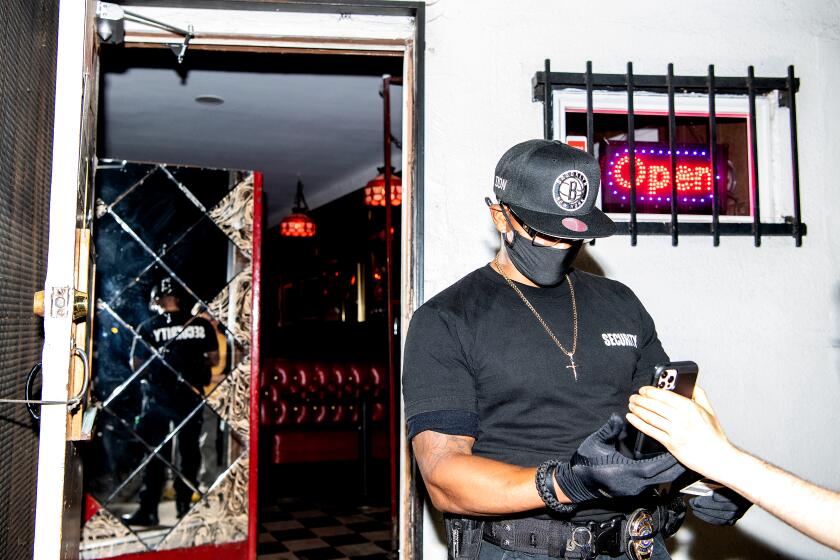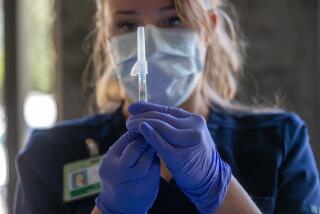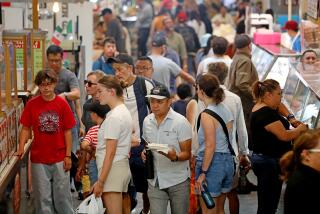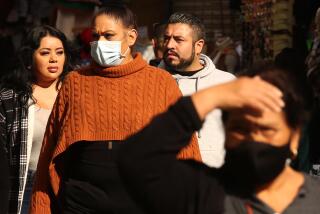CDC relaxes guidelines for masks but still recommends them in L.A. County
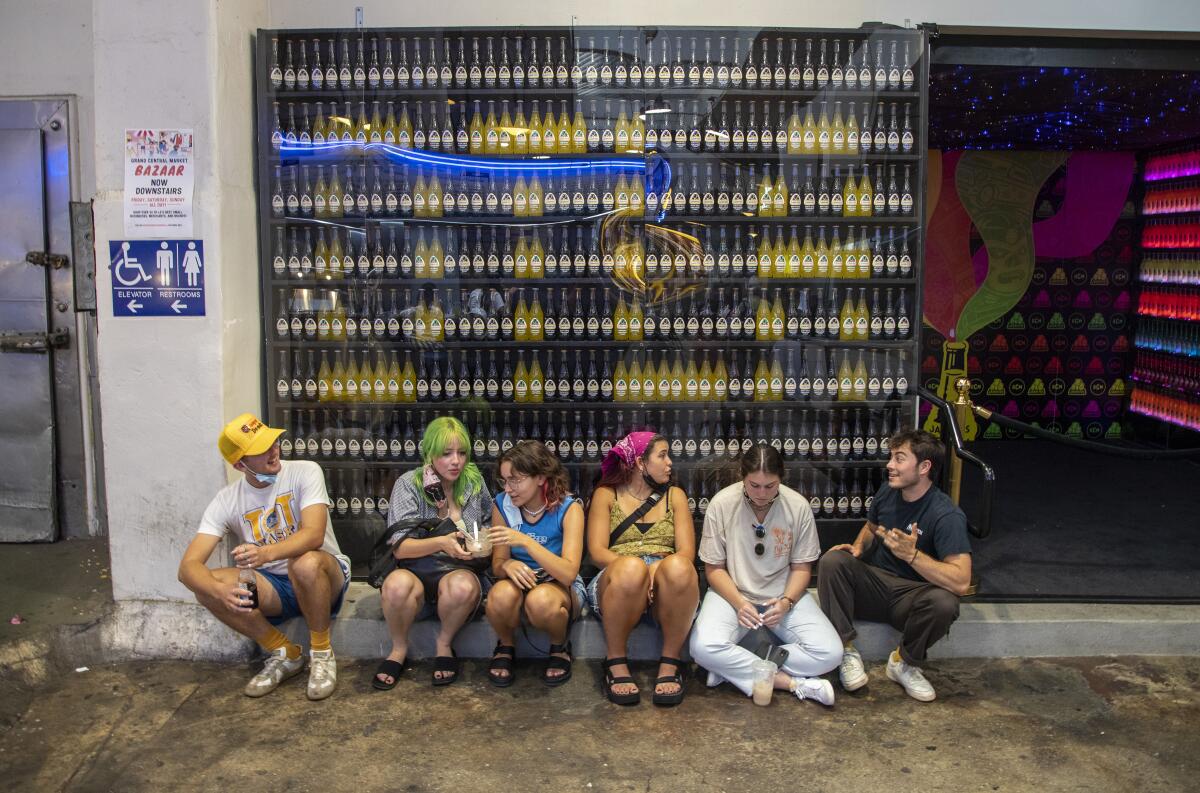
Americans are no longer advised to wear masks in public indoor settings in many parts of the country under new federal health guidance unveiled Friday — but the same can’t immediately be said for Los Angeles County.
The new guidelines from the U.S. Centers for Disease Control and Prevention ease general masking recommendations on a county-by-county basis based on local coronavirus case and hospitalization rates, as well as the share of a region’s inpatient beds that are occupied by COVID-19 patients.
Using those metrics, counties are sorted into one of three COVID-19 Community Levels: low, medium or high.
As of Friday, L.A. County officially remains in the high category, the only one for which the CDC continues to recommend universal indoor masking. But L.A. County is on the knife’s edge of leaving the high level and entering the medium category, a transition that could occur as soon as next week.
In fact, according to data elsewhere on the CDC’s website, the county’s metrics may have already improved to a point to qualify for medium.
The unveiling of the new CDC framework was eagerly anticipated in the nation’s most populous county — which remains one of the few parts of California that still require everyone age 2 and older to wear masks in indoor public settings, regardless of whether they’ve been vaccinated against COVID-19.
L.A. County health officials have said they planned to review the latest guidance and present some options for a new masking policy at Tuesday’s Board of Supervisors meeting. They said they would then consult with business and labor groups, meaning a new masking plan could become clearer later next week.
Speaking to reporters Thursday, county Public Health Director Barbara Ferrer pledged to “carefully review the proposed goals, the metrics and the strategies in relation to local conditions and priorities; determine how to best align and integrate relevant metrics and strategies in our own mitigation plans.”
Ferrer said Thursday that she didn’t expect the county to adopt the CDC’s new guidelines mere hours after they were were released Friday afternoon. She added that she thinks “it would be a lot to ask us to move immediately with changes because we do know that CDC is going to ask everyone to look at local conditions as they make moves.”
“We have to look at it,” she said.
Even though there may no longer be a mask mandate, experts say it still makes sense to wear them inside because they offer strong protection.
According to data provided by the CDC, 30% of the U.S. population lives in areas with a low COVID-19 community level, 42% are in medium and 28% are in high.
That means the CDC still recommends universal indoor masking in counties where more than a quarter of the U.S. population lives, including in San Diego County, much of the San Joaquin Valley and Imperial County, and rural Northern California.
For places in the medium level, the agency says higher-risk people, such as those with weakened immune systems, might want to wear a mask. Counties in this category include Orange, Riverside, San Bernardino, Ventura, Santa Barbara, Santa Clara and Sacramento.
“At this level, CDC recommends that people who are high risk, [such as] someone who is immunocompromised, should talk to their healthcare provider about taking additional precautions and may choose to wear a mask,” said Greta Massetti of the CDC’s COVID-19 Response Incident Management Team.
Those in the low level — such as San Francisco, Alameda, Contra Costa, Sonoma and San Luis Obispo counties — aren’t subject to any additional mask recommendations beyond those that apply to specified settings identified by the state or federal government. Those include nursing homes, indoors at K-12 schools or while aboard public transit.
However, the CDC also is easing its recommendations for wearing masks in indoor K-12 settings. Until now, the agency recommended universal masking in schools, no matter what the level of coronavirus transmission. Now, the CDC will recommend universal masking in schools only in communities in the high level.
U.S. officials say most Americans live in places where healthy people no longer must wear masks. But they’re still required on public transit.
California officials have already said they are reassessing the statewide school mask mandate, and plan on Monday to announce a timeline for potentially relaxing it.
CDC Director Dr. Rochelle Walensky said people who feel more comfortable wearing masks should continue doing so. But given how many people have been vaccinated, as well as the broader availability of testing and treatments, she said it makes sense to adopt a framework that provides a more complete snapshot of the pandemic.
“As the virus continues to circulate in our community, we must focus our metrics beyond just cases in the community and direct our efforts toward protecting people at high risk for severe illness and preventing COVID-19 from overwhelming our hospitals and our healthcare system,” she said Friday.
At indoor businesses and offices that verify vaccination status, people who are fully vaccinated will no longer have to wear masks starting Friday.
L.A. County, unlike most of California, has maintained a local universal indoor mask mandate even after the statewide order was lifted last week. Masks also remain mandatory in L.A. County courthouses, according to a statement from Presiding Judge Eric C. Taylor.
Rather than pinning the relaxation of the requirement to a specific date, L.A. County officials previously said they were aligned with the CDC’s previous guidance — which recommended that everyone, regardless of vaccination status, mask up in areas with elevated coronavirus transmission.
Before Friday, the CDC had recommended easing indoor mask requirements only in areas with “moderate” transmission; to get there, a community would need to get under 50 cases a week for every 100,000 residents. In L.A. County, that meant the goal was to get to under 730 cases per day, averaged over a weekly period.
Though the most recent COVID-19 wave has been receding rapidly, L.A. County remains a ways off from that threshold.
According to a Times analysis, the county has reported an average of about 2,100 new coronavirus cases a day over the last week, a drop of more than 40% from the previous week. The week before that, about 6,100 cases a day were reported. And before that, 14,400 cases a day were tallied.
Based on current trends, county health officials forecast that the mask mandate could be lifted in mid- to late March.
Getting to the CDC’s newly defined medium category, however, seems like a far more imminent possibility.
There are two ways for L.A. County to progress to the next tier. In one, it would need to report fewer than 10 new coronavirus-positive hospitalizations for every 100,000 residents over a weeklong period. The county’s latest rate is just above that threshold, at 10.6, CDC data show.
The other option would be for L.A. County’s coronavirus case rate to drop below 200 new cases a week for every 100,000 residents. This, too, is just out of reach at the moment — as the county’s latest calculated case rate stands at 216.
It’s possible that L.A. County has already qualified for the medium category. Data posted to another part of the CDC’s site late Friday suggest so, but the CDC’s official designation of counties in each of the new tiers is not expected to be updated until next week.
Santa Clara County is one of several local governments in California, including L.A. County, to retain a universal indoor mask mandate.
Whatever the timing, recent moves at the federal, state and even local level have made L.A. County a distinct outlier in its approach.
Officials in the cities of Long Beach and Pasadena, which have their own independent health departments, said this week they are moving to align their local requirements with the state’s more permissive rules, rather than the county’s.
Palm Springs also will no longer require masks in many indoor settings starting Monday. Another jurisdiction aside from L.A. County that is keeping a local mask mandate on its books is Mendocino County.
In Santa Clara County, Northern California’s most populous, officials set a lower bar for relaxing indoor masking: an average of 550 new coronavirus cases per day over a weeklong period. The county has since dipped below that marker and could lift its masking requirement as soon as March 2.
L.A. County officials have maintained that their rules are not etched in stone, and that they can and will alter their approach as conditions warrant.
“Our collective efforts to vaccinate, boost, mask and follow other safety measures are bringing us closer to pre-surge levels,” Ferrer said. “As we move forward and continue to see improvements associated with less transmission, we will implement sensible changes to our mitigation strategies that allow us to use the most appropriate tools for protecting residents and workers from the damaging effects of COVID.”
The revised rules take effect 12:01 a.m. Friday and will make masking optional indoors in certain settings that screen the vaccination status of patrons.
Amid a continued decline in the number of coronavirus-positive patients hospitalized countywide, the region last week relaxed its rules to allow people to go without face coverings outdoors at K-12 schools and child-care facilities, as well as in exterior areas of mega events, such as those at the Hollywood Bowl, Dodger Stadium, SoFi Stadium and Los Angeles Memorial Coliseum.
And under a new health order that went into effect Friday, fully vaccinated individuals can ditch their masks indoors at establishments that screen the inoculation status of visitors and patrons.
In Los Angeles County, proof of COVID-19 vaccination is required at indoor bars, wineries, breweries, distilleries, nightclubs and lounges. Such rules are far more expansive in the city of L.A., covering additional indoor spaces such as restaurants, movie theaters, hair and nail salons, coffee shops, gyms, museums, bowling alleys and performance venues.
Mayor Eric Garcetti confirmed Friday that the city will ease indoor masking requirements at those businesses that require vaccination proof, saying, “This moment gives us a renewed sense of optimism about the direction of this pandemic.
“We are able to take these steps today because of our collective determination and sacrifice, and we should take pride in that,” he said in a statement. “But we’re not out of the woods, and we know that as the pandemic evolves, our collective fate will increasingly depend on our individual choices and actions. Now is the time to strengthen our resolve to protect the health and safety of everyone around us.”
More to Read
Sign up for Essential California
The most important California stories and recommendations in your inbox every morning.
You may occasionally receive promotional content from the Los Angeles Times.
